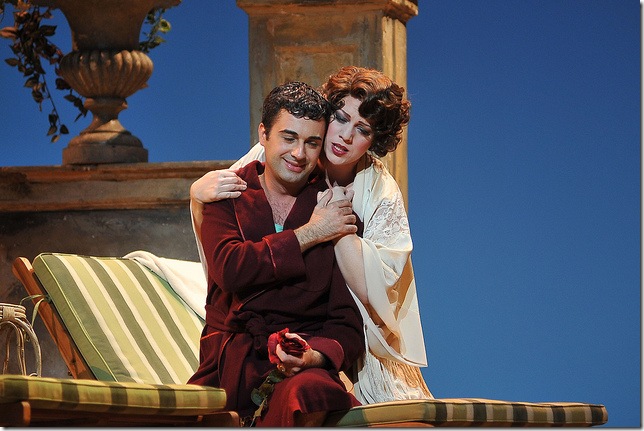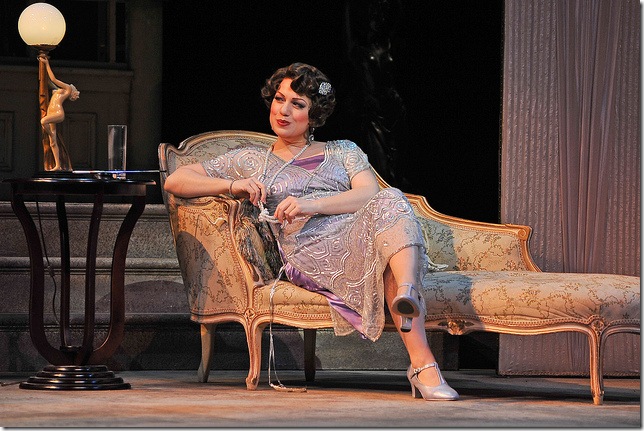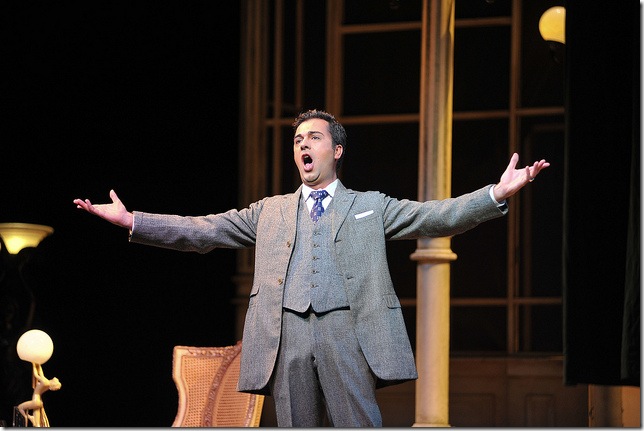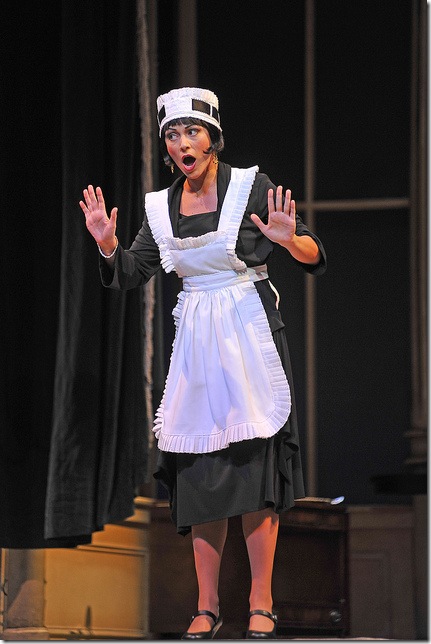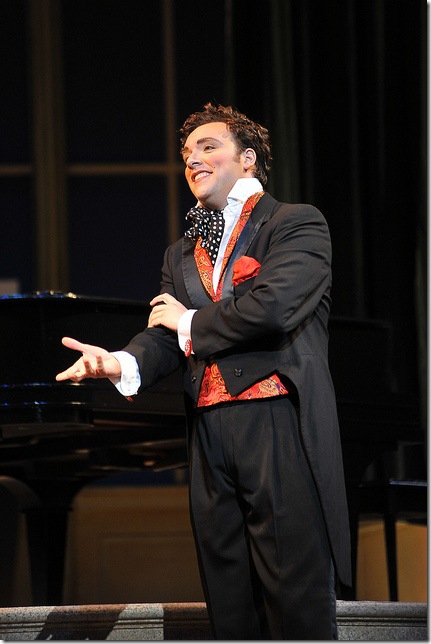The soprano who created the role of Magda in Giacomo Puccini’s La Rondine said late in life that the composer died “with the wound of ‘Rondine’ in his heart,” having never gotten over the opera’s mixed record of success and failure.
In its first-ever mounting of the bittersweet opera Puccini wrote for a Viennese commission, Florida Grand Opera has taken an important step toward healing some of that wound with an engaging, elegant staging that also should advance the careers of its principal singers.
Not everything works in this Rondine, but that’s mostly due to the third act of the opera and not the production, which is borrowed from New York City Opera and sets the action in the early 1920s, later than the original Second Empire backdrop. British director Nicola Bowie has managed the stage action well, with good business on the side in the first act, plenty of inviting action in the second, and a welcome dose of comedy and lightness in the third.
It’s the singing that matters most, though, in this lovely and unusual score, and in Elizabeth Caballero, FGO has found a soprano in its own backyard who owns the part and makes a very strong case for this opera. She has a big, powerful voice, and in her Chi bel sogno di Doretta in the first act, she laid claim to ownership of the stage with a super-soft high C, seizing the audience’s attention in good old-fashioned diva style.
A Cuban-American who came to Miami as a child on the Mariel boatlift, Caballero has long been a local favorite with FGO and area audiences, and she sang quite well on Saturday’s opening night. She showed her musical mettle in the third act particularly, making the most of the delicate gorgeousness of the passage in which she reads Ruggero’s mother’s letter (Figliuolo, tu mi dici), and just afterward, when she echoes her lover’s Ma come puoi lasciarmi in a higher key, and had plenty of vocal muscle left to do it.
Some of Caballero’s movements on stage were stiff, as if she wasn’t entirely comfortable with her body; her range of motion was less than it could have been, which made her character a little less compelling. And in her top register, particularly when she got louder, her voice got somewhat shrill and her vibrato quite wide. The largeness of her instrument compensates somewhat for that in what is a very difficult role to sing, but some of the vocal extremities here could use some more control.
As Ruggero, the Portuguese tenor Bruno Ribeiro has a thankless task in having to inhabit an underdrawn character, but he has a bronze-like, darkly colored voice that suited the earnestness of the young man who promises new love for Magda. This production includes the first-act romanza Parigi! E la citta de’ desidieri, which Puccini added later, and which deserves to stay.
Ribeiro sang a little under pitch here, especially at the end of the aria, and his singing in the rest of the opera, while admirable from the standpoint of good tone quality and secure placement, lacked suavity, which it needs for audience appeal and character veracity: he is, after all, a young, vulnerable man, and we need to hear that as well as see it. He was on the wooden side, in both singing and acting, but at his best his voice blended agreeably with Caballero’s, and the two made a good couple onstage.
La Rondine also is unusual in that it has two supporting tenor-soprano parts that have about as much work to do as the leads. And FGO has two excellent ones, which does a lot to make this production work.
As Lisette, American soprano Corinne Winters (whose memorable Sempre, libera at the Palm Beach Opera Grand Finals in 2010 stole the show), is marvelous, with a large, smoothly rounded voice that easily handled all the challenges of this role with aplomb. Only toward the end of the third act did her instrument weaken somewhat, but while it lost volume it didn’t lose accuracy.
She was a fine actress, too, in a fun part that allows her to be silly and sexy, and she made a wonderful foil for her Prunier. Winters looked great in her flapper and housemaid getups as well, and overall this was a most impressive performance.
Equally good was American tenor Daniel Shirley as Prunier, a singer with a cutting spinto who made audience ears perk up with a walk-on in FGO’s Luisa Fernanda in November. Here he could be heard at evening’s length, and he did a stellar job, singing with clarity, forcefulness and charm in every bar.
Shirley’s Prunier was lovable-rouguish, the kind of gregarious guest everyone likes at a party, and easily believable as the kind of man someone like Lisette would fall for. He and Winters made an ideal team, and they help carry the show.
As Rambaldo, the American baritone Craig Colclough was rather bland vocally and dramatically. He delivered his admonition to Magda in Act II rather perfunctorily, and he left with a creepily angry glare that seemed at odds with the steadiness of the character.
There were some fine other voices on stage, with American soprano Brittany Ann Renee Robinson first among them as Yvette, with Courtney McKeown as Suzy not far behind. John Keene’s chorus sang the big second-act brindisi expertly, though conductor Ramon Tebar drove the tempo a bit hard. This set piece should sound opulent, and it should gradually grow, but here it sounded determined to be big, and it came off too rigidly.
But in general, Tebar conducted this work admirably, with the youthful fire that distinguishes his baton work, and just as generous a helping of sensitivity, particularly in the most delicate moments. His orchestra performed beautifully for him, critical in Puccini, in which, like Wagner, so much of the psychological commentary and emotional mood is depicted in the orchestra.
This is a handsome Rondine, nicely designed by Ralph Funicello, with four strong principals advocating persuasively for this neglected score. The third act, as always, remains a problem, but perhaps in future productions some of the later revisions could be added in to give the ending a little more heft. For my way of thinking, it’s missing about another five minutes of material; it reminds me of Manon Lescaut in that the first two acts are brilliant, but the rest is something of a botch.
Still, if you’re a true Puccini devotee, this is an opera you want to see, and FGO’s production is good enough to argue for its inclusion in the general repertory as more than a one-off visitor. Caballero lobbied FGO general director Robert Heuer hard for a local production of La Rondine, and it’s a good thing she did.
La Rondine can be seen at 8 p.m. Jan. 24, 27, Feb. 1 and 4, and at 2 p.m. Sunday, Jan. 29, at the Ziff Ballet Opera House in Miami. Tickets start at $21. Call 900-741-1010 or visit www.fgo.org.
